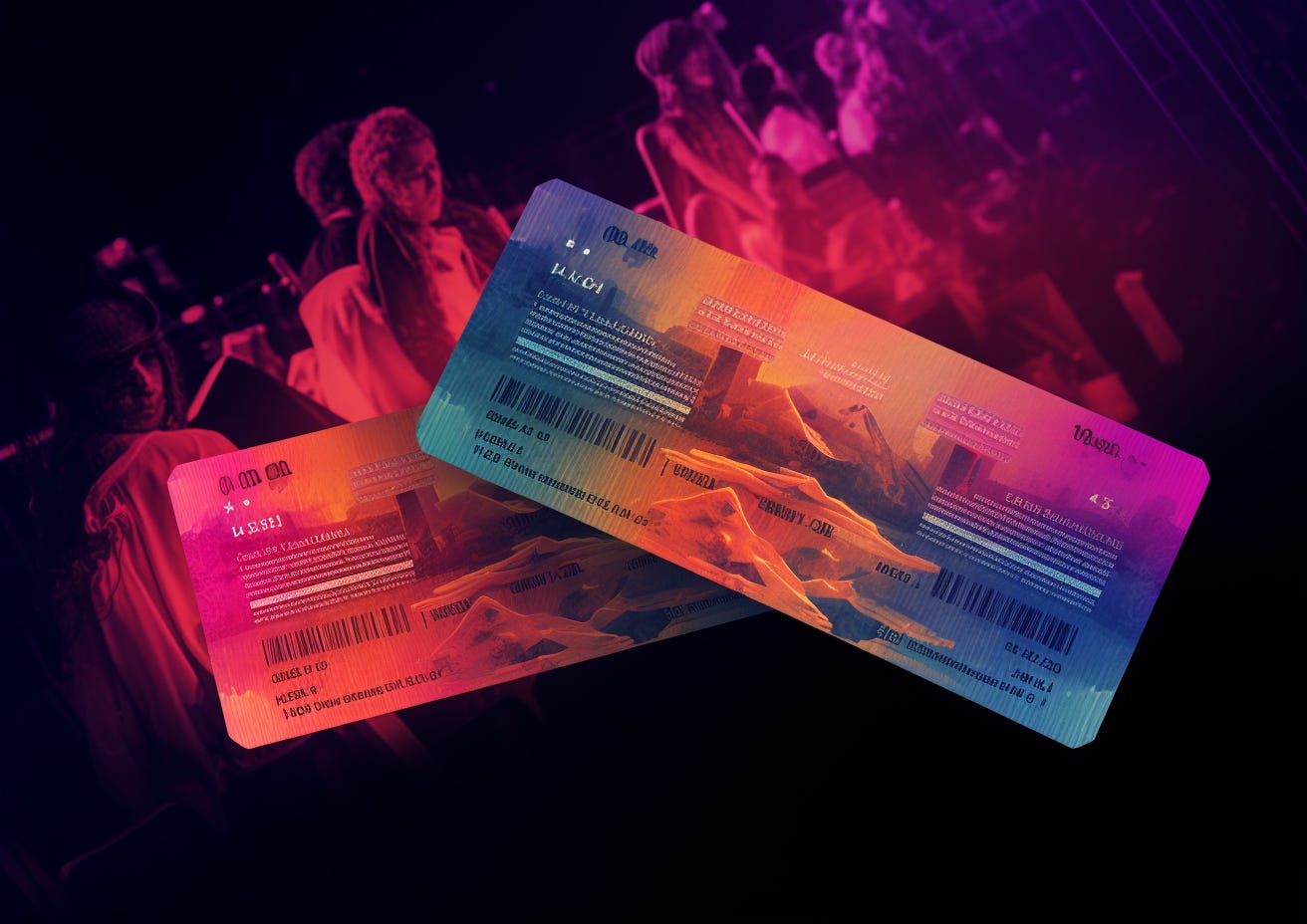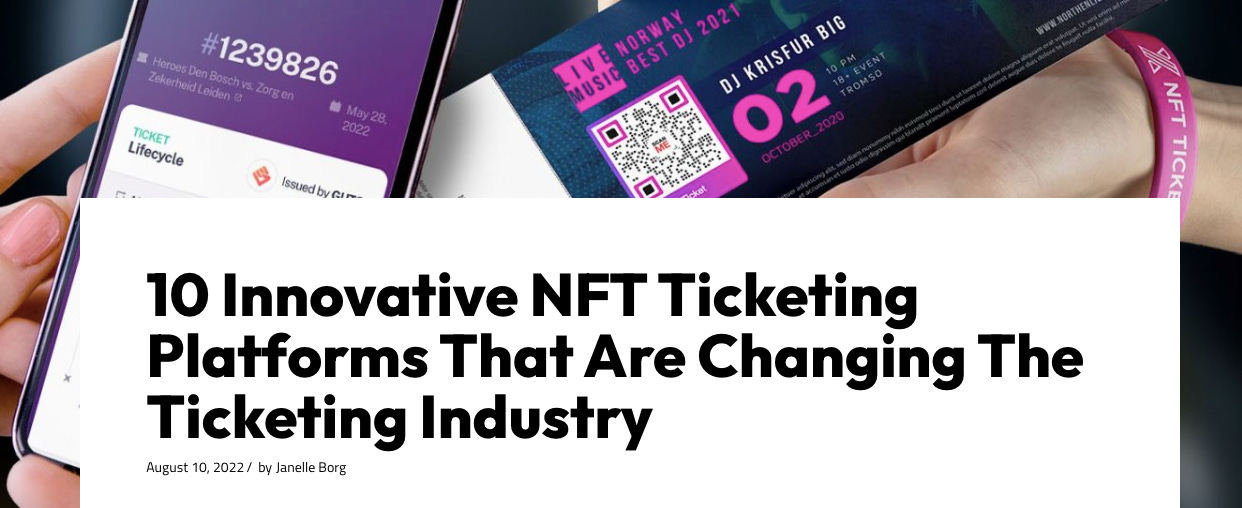Wednesday W.O.W - NFTs for Ticketing 🎟️🌐
[5 min read] Your mid-week bite sized treat on emerging tech on our journey to the Metaverse. Learn why ticketing is an ideal use case for NFT technology, and discover the case studies emerging.
A nibble of knowledge in your inbox every Wednesday with a simple format:
🇼 What the technology is.
🇴 Objective(s) - what is it trying to achieve, with some examples
🇼 Why it is important.
This is week 49 of the 520 weeks of writing I have committed to, a decade of documenting our physical and digital lives converge.
🇼 What are NFT Tickets?
NFT ticketing, short for Non-Fungible Token ticketing, marks a pioneering shift in the way we think about event access. At its core, NFT ticketing is about the digitisation of tickets using blockchain technology. The result is a secure and transparent system for issuing and managing tickets, which, in turn, enhances the entire event experience.
Traditional event tickets, whether in paper or digital format, have long been susceptible to issues like counterfeiting and scalping. NFT tickets, on the other hand, leverage the power of blockchain to make these problems a thing of the past. Here’s how it works:
Security Through Blockchain: Each NFT ticket is a unique digital asset stored on a blockchain. This makes it nearly impossible to forge or duplicate, as its authenticity is cryptographically secured. Consequently, event-goers can have complete trust in the legitimacy of their tickets.
Flexibility in Ticket Types: NFT tickets offer versatility in ticket types, allowing event organisers to create distinct categories, such as VIP, general admission, or even exclusive access to backstage areas. Furthermore, specific details like seat numbers and access to premium content can be embedded in the NFT, offering a highly customised experience.
Streamlined Ticketing: This innovative approach simplifies the ticketing process, reducing both time and resources spent on ticket issuance and management. Organisers can efficiently cater to the unique demands of their attendees.
But NFT tickets are not just about secure and efficient ticketing; they represent ownership of a unique experience, and have the ability to gatekeep access to a community. Whether it’s gaining entry to a theme park, attending a sports event, or enjoying a live concert, NFT tickets ensure a seamless and unparalleled experience.
🇴 What are the Objectives?
The adoption of NFT ticketing is driven by several key objectives, each designed to enhance the ticketing process and the overall event experience (for everyone except intermediaries!). Let's explore these objectives with some real-world examples.
Immutable Ownership: One of the primary goals of NFT ticketing is to provide event-goers with irrefutable proof of ticket ownership. Imagine attending a music festival with an NFT ticket; not only does this grant you entry, but it's also a unique digital keepsake of the event.
Example: A concertgoer purchases an NFT ticket for a music festival. This digital asset not only gains them access to the event but also contains event details, the ticket holder's name, and their assigned seat. It becomes a cherished memento of the event, and unlocks digital experiences after the event - or a discount off future events.
Transparency and Traceability: Blockchain technology ensures that the history of each NFT ticket is recorded, offering complete transparency. This allows event organisers and ticket holders to verify the ticket's authenticity and origin with ease.
Example: An event organiser can trace the entire history of an NFT ticket, from its creation to its sale and every subsequent transfer, providing a clear picture of its provenance.
Secondary Market: NFT tickets introduce a thriving secondary market, enabling ticket holders to resell or trade their tickets on online platforms. The artist or organiser can hardcode a royalty fee for these (5-10% is common). This way “scapling” is incentivised less.
Example: If a fan can't attend a highly-anticipated sporting event, they can sell their NFT ticket on an online marketplace. The price they receive might be significantly higher than the original purchase price due to increased demand.
Enhanced Fan Engagement: NFT tickets allow event organisers to create additional layers of engagement with fans. This could include offering backstage passes, meet-and-greets with performers, or exclusive merchandise as part of the NFT ticket. “Tiered benefits” based on the number of concerts attended can stack up, rewarding longtime fans
Example: A music festival might offer diehard fans that hold NFT tickets from 5 concerts the chance to meet their favorite band, creating a more immersive and unforgettable experience. Tickets can unlock access to private online communities, exclusive merch, etc.
🇼 Why Could NFT Tickets Shape the Future of Events?
By better connecting Fans to Artists, and eliminating intermediaries, all kinds of opportunities are unlocked. NFT ticketing is still a relatively new concept in the ticketing industry, but it shows tremendous promise in shaping the future of events for several reasons:
Enhanced Security: The blockchain technology that underpins NFT tickets provides unmatched security. With their immutability and traceability, NFT tickets significantly reduce the risk of fraud, ensuring that ticket holders get the experience they paid for.
Flexibility and Resale: NFT tickets provide an exciting secondary market where fans can buy, sell, and trade tickets. This flexibility is a game-changer, allowing tickets to reach their true market value. This magnified the value created.
Efficient Ticket Management: Event organisers benefit from a more efficient ticket management process. NFT tickets streamline the issuance and distribution of tickets, saving time and resources.
However, it's important to acknowledge that NFT ticketing is not without its challenges. The value of NFTs can be volatile, and there's a lack of infrastructure for widespread adoption. There is a learning curve to a digital wallet, although UI/UX is improving. Concerns about scams and the evolving regulatory landscape also need to be addressed. Technical issues related to blockchain can impact the ticketing process, and some users may find NFTs complex to handle.
Despite these challenges, NFT ticketing offers a plethora of benefits that could significantly influence the future of events. The ongoing technological advancements in the field, coupled with the potential for decentralised marketplaces, hint at a bright future for NFT ticketing.
Bonus: Some examples of platforms using this tech
Dive in below:
That’s all for this week! If you have any organisations in mind that could benefit from learning about emerging technology, be sure to reach out. Educational workshops are one of many consulting services I offer.


